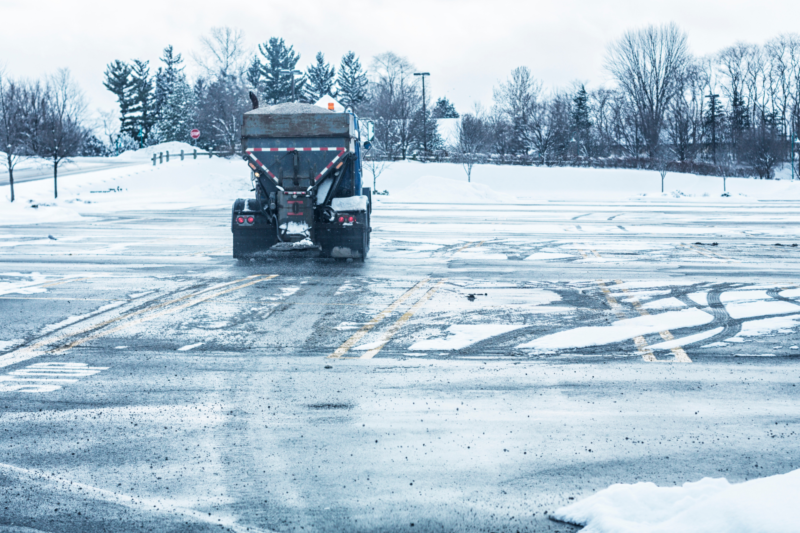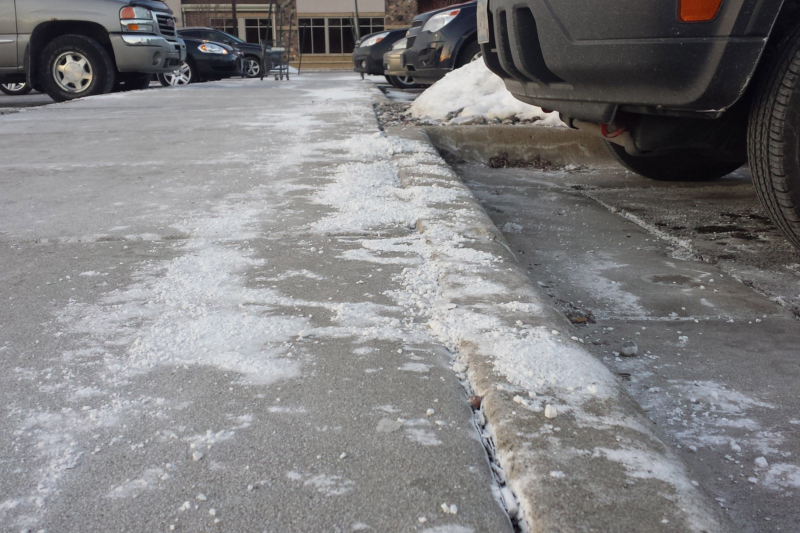
In the wintertime, the ground crunches everywhere you walk. But this probably isn’t because of fresh snow. Rather, it’s de-icing rock salt.
Salt can melt ice, increase traction, and keep asphalt dry. Commercial property managers spread it during the colder, wetter months. Question is, does salt damage asphalt?
Unfortunately, this is not a simple yes-or-no answer. Salting a driveway can avoid damage to asphalt if done in a proper way. So in this guide, we’ll discuss everything you need to know when you salt your asphalt.
Find A Snow and Ice Removal Contractor
How Does Salt Work to Melt Snow and Ice on Asphalt?
Sodium chloride rock salt, or de-icing salt, is one of many solutions for melting ice in winter temperatures. It functions by lowering water’s freezing point by converting it into a brine solution. Saltwater does not freeze as fast as H2O.
This brine water then seeps below the level of the ice that has formed. It breaks through the ice that has adhered to the asphalt, melting it as well. The result is a driveway that is relatively ice-free.
Does Salt Damage Asphalt?
Salt itself does not damage asphalt. However, it can accelerate normal asphalt deterioration, that is, asphalt that has not received proper maintenance.
Asphalt deals with a lot of abuse. Extreme heat, UV rays, and concoctions of oil and gas can degrade the surface. The weight of a car and the wear from tires speed this up as well.
To counter this, asphalt needs regular maintenance. It’s ideal to seal the top of a resident’s driveway, fill cracks, and/or paving. This protects asphalt and allows it to last for many years to come.
Find A Commercial Asphalt Contractor
However, this is required summer maintenance. Commercial property managers need to handle this in the warmer summer months. By the time winter rolls around, it may already be too late to do anything until the following summer.
Freeze-thaw cycles put extreme stress on the average driveway or residential road. Brinewater formed from the salt seeps into the cracks, where it can refreeze. This widens cracks and speeds up the deterioration of asphalt, even in normal conditions.
Does Salt Harm the Environment?
Many commercial property managers have been looking for ways to go green. Sustainability projects help to strengthen bonds with the local community. After all, you want to keep the ecosystem where you do business in good condition!
Unfortunately, there are staggering environmental effects from salt on asphalt:
- It salinates local freshwater habitats, killing or driving out freshwater species
- It allows invasive saltwater species to replace them
- Plants absorb it, leading to drought-like damages (a literal example of “salting someone’s fields”)
- It contaminates the groundwater
- Traffic throws it up into the air, where it spreads as dust to other environments
In short, it’s best for the green-conscious property manager to find alternatives. Ice melt mix and calcium chloride may pose fewer risks to the environment.
How to Prevent Salt Damage to Asphalt
The first obvious solution is to treat your property’s asphalt. This is an investment in the lifespan of your asphalt. The cost now might seem like a lot, but it won’t be as much as replacing asphalt early.
This maintenance needs to happen every year. New cracks and fissures may appear after another freeze-thaw cycle. Making sure to seal any holes will prevent further damage and extend the asphalt’s lifespan.
Find A Commercial Asphalt Contractor
Maintenance is just one part of protecting asphalt. There are a few other ways you can extend asphalt’s lifespan.
Mix Sand into Your Rock Salt
Sand is a nice filler for rock salt. It’s cheap, meaning you can save some money by mixing it with sodium chloride. It still helps to achieve the same effect.
This is a great way to protect the environment. Sand won’t disrupt local ecosystems. However, you may need to clean that sand up when summer comes around.
One downside of sand is that it will make the area very dusty after the thaw. The sand can be hard to remove, making the dust last for longer. In some cases, this won’t be an issue.
Use Alternative Chemicals
As mentioned above, rock salt isn’t good for the environment in such large quantities. It kills flora and fauna and causes disruptions to natural ecosystems. That and it can damage untreated asphalt.
Try out other kinds of de-icers, such as ice melt. These have an even lower melting point than brine, meaning you’ll have faster results. These chemical alternatives can come in pet and plant-safe varieties as well.
Use a Plastic Shovel
If you or your employees clear a driveway or parking lot, use plastic shovels. Metal shovels can scrape and scar your asphalt. This exposes it to rock salt, speeding up damage.
Plastic shovels are more gentle. They’re less likely to damage asphalt or increase the damage to existing areas.
Consider Installing a Heating System
A heating system will be an expensive investment. It will require ripping up an existing driveway for installation. However, in some cases, you may prefer this over the alternative.
Clearing snow can often be a daily job, sometimes occurring multiple times throughout the day. This necessitates hiring people to do the work or doing it yourself. If you’re tired of shoveling snow, then a heating system might be a worthy investment.
Maintain Your Properties Well
Does salt damage asphalt? It can, but a commercial property manager that stays on top of maintenance shouldn’t have to worry. However, rock salt is not the best for the environment, and there are a lot of alternative solutions.
Property management comes with a whole laundry list of challenges. That’s where Property Manager Insider is here to help. Check them out for the latest property management insights.
Find A Contractor for Your Snow and Ice Needs
Property managers can use BidSource to have our team find a commercial snow and ice management contractor ready to assist with your needs this winter. Share your snow and ice management needs using the form below and our team will be in touch with a qualified contractor!



